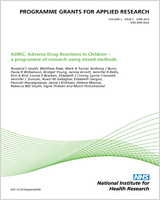Included under terms of UK Non-commercial Government License.
NCBI Bookshelf. A service of the National Library of Medicine, National Institutes of Health.
Iliffe S, Wilcock J, Drennan V, et al. Changing practice in dementia care in the community: developing and testing evidence-based interventions, from timely diagnosis to end of life (EVIDEM). Southampton (UK): NIHR Journals Library; 2015 Apr. (Programme Grants for Applied Research, No. 3.3.)

Changing practice in dementia care in the community: developing and testing evidence-based interventions, from timely diagnosis to end of life (EVIDEM).
Show detailsInformation for district nurses and general practitioners
The EVIDEM-EoL Phase 1 tracked over 1 year the care received by people with dementia in six care homes. The findings suggested that fundamental to good care is the way of working together of NHS care home staff, family members and, where possible, people with dementia.
Phase 2 is an intervention-based study with three care homes, underpinned by collaborative working. Care home and primary care staff identify an area for improvement around the care of a person dying with dementia, and develop strategies to implement this. To facilitate this we are using an AI approach. The originator David Cooperrider first worked with physicians in USA and noted that when he asked doctors about success rather than failure their energy, enthusiasm and motivation shifted.
Appreciative Intervention is both a philosophy and process that has been widely applied to change in health care. Fundamentally, it is the search for the best in people and their organisations and the assumption that within a system there is always something that is working. This strength-based change uses enquiry, positive questions, and good experiences to explore, discover and open up new possibilities with others who are important in the system.
In January we will begin this through ‘appreciative conversations’, asking you when you saw things working at their best in relation to people dying of dementia in care homes. So in preparation we would like you to think about a situation where you felt you or the team you were working with, delivered care that allowed a resident to die well. This may be in relation to symptom control, how you worked with the care home or were able to carry out the wishes of the resident or their family.
Think about
What made the situation really special?
What was your contribution?
How did it feel?
Has it changed you in any way, if so how?
How did the care home or other primary care team members help you in this?
What do you think was really making it work?
Talk about
Find a colleague and talk about it together, are your experiences similar? We call this Good Gossip and can happen over a break, as well as structured meeting times in the course of work.
Cooperrider D. Appreciative Inquiry: towards a methodology for understanding and enhancing organizational innovation. Doctoral Dissertation. Cleveland, OH: Western Reserve University; 1986.
Reed J. Older people maintaining wellbeing: implications for future developments. Int J Older People Nurs 2008;3:76–8.
Alfred R, Shohet R. ‘What’s the best day you’ve ever had at work?’ Appreciative Inquiry at the Manchester Heart Centre. In Edmonstone J, editor. Building on the Best: An Introduction to Appreciative Inquiry in Health Care. Chichester: Kingsham Press; 2006.
- Chapter 4: Intervention information – district nurses/general practitioners - Ch...Chapter 4: Intervention information – district nurses/general practitioners - Changing practice in dementia care in the community: developing and testing evidence-based interventions, from timely diagnosis to end of life (EVIDEM)
Your browsing activity is empty.
Activity recording is turned off.
See more...